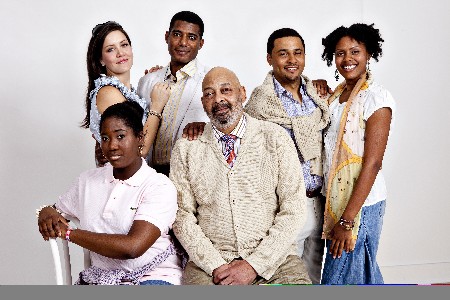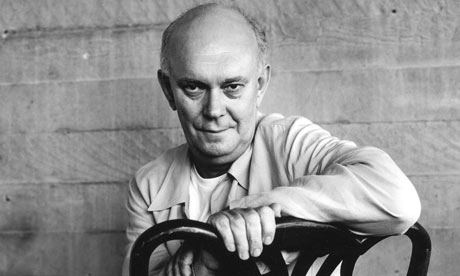Coming Attractions in Theater: February 2010
A recent piece in the New York Times provides further proof of the increasingly pernicious stranglehold marketing exerts on the production of new voices in the theater.
By Bill Marx
Let’s face it—the fastest growing segment of non-profit hiring in the arts over the past decade or so, marketing, is now pretty much in the cultural driver’s seat in economic hard times. Thus theaters and hybrid critic/publicists are stuck trying to spin audiences into believing that arthritic dramatic warhorses (“All My Sons”) or trite new plays by brand-name playwrights are “bold” or “must see” fare.

Cast members in the Huntington Theatre Company's upcoming production of "Stick Fly"
Most of what is in The New York Times (NYT) article was not news to anyone who goes to the theater regularly and is struck by the timidity and predictability of the “product.”
Here are a trio of interesting graphs:
Many of the playwrights see the nation’s major nonprofit theater companies as impediments to their work, favoring plays that have few characters to save money on actors’ salaries, for instance, or that have themes appealing to large audiences. Playwrights say artistic directors are obsessed with selling tickets in spite of their nonprofit missions and with pleasing board members by favoring world premieres or playwrights who are already admired by critics.
“We heard from artistic directors who admitted that they’re all going after the same 10 playwrights to produce their work, which is largely about getting prestige in their field,” said Todd London, the chief author of the study and book, Outrageous Fortune: The Life and Times of the New American Play. Mr. London, the artistic director of New Dramatists, a group that helps playwrights, declined to name those artistic directors or playwrights.
Theater leaders and artistic directors, meanwhile, are frustrated by the lack of private and government money available to produce new plays and feel under pressure to balance budgets just to survive, according to the study. These executives also tend to view playwrights as insufficiently savvy about the cold realities of the business and say playwrights harbor misperceptions—that executives are less concerned with audience reaction or controversial subject matter than playwrights assume, for instance.
I can name some of the “blessed circle” of playwrights who regularly receive premieres of mediocre work: David Mamet, Neil LaBute, Sarah Ruhl, and Rebecca Gilman. I have not exhausted the tribe. Those who have names to add to the list of dramatists who get automatic passes because they are best known for being a known “commodity” should send them along to The Arts Fuse.
In my theater selections I do my best to highlight companies that are producing new work or unusual plays from the past. If I overlook a play or production, let me know—I will add it on. And please alert me of links to works and/or productions in the future that challenge the sedate status quo.
A Worthy Cause: The American Repertory Theater, Punchdrunk and the cast of its sold-out production of “Sleep No More” at the Old Lincoln School in Brookline, are organizing a benefit performance of the smash hit “Sleep No More” on Wednesday, Feb. 3, 2010 at 7:30 p.m. Proceeds will benefit Partners In Health’s relief efforts in Haiti. Ticket prices are $100. They can be obtained online or by phone at 617-547-8300.
1: Funnyhouse of a Negro by Adrienne Kennedy. Directed by David R. Gammons. Choreography by Susan Dibble. Staged by the Brandeis Theater Company at the Laurie Theatre, Brandeis University, MA, Feb. 4-14. This one-act play, the Dadaesque tale of a light-skinned black woman who denies her racial heritage to the point of schizophrenia, kicked off the long career of Adrienne Kennedy. It will be interesting to see if the script, which was shocking when it premiered in 1964, remains more than a period piece today.
2: Almost, Maine by John Cariani. Directed by Craig J. Faulkner. Staged by the Seacoast Repertory Theatre, Portsmouth, NH, Feb. 5-28. Given the current cold spell, it is an appropriate time for a contemporary “love in deep freeze” stage experience. “A cold, clear moonless night in the middle of winter,” runs the publicity summary, “all is not quite what it seems in the remote, mythical town of Almost, Maine. Unexpected and hilarious, hearts are broken and mended—almost—in this delightful midwinter night’s dream.”
3: Not Enough Air by Masha Obolensky. Directed by Melia Bensussen. Presented by the Nora Theatre Company at the Central Square Theater, Cambridge, MA, February 11 through March 14. Obolensky is on the theater faculty at The Boston Conservatory and is currently pursuing her MFA in playwriting at Boston University. This is the East Coast premiere of her play, which is inspired by how “famed journalist-turned-playwright” Sophie Treadwell was “drawn into the sensational 1920’s murder trial of Ruth Snyder.” The result: Treadwell’s landmark play, “Machinal.”
4: Black Pearl Sings! by Frank Higgins. Directed by Benny Sato Ambush. Staged by the Merrimack Repertory Theatre (MRT), Lowell, MA, Feb. 11 through March 7. The reviews of the show’s Washington D.C. production are not reassuring, but let’s see what the MRT does with how “the search for lost African-American folk music leads Susannah, an ambitious ‘song collector,’ to Pearl, a prisoner with a soulful voice, steely spirit, and an incredible history. Tracing the roots of many beloved American songs, the legacy of the past clashes with hopes for the future, as the two women journey to find their way out of the shadows and into the spotlight.”
5: Private Fears in Public Places by Alan Ayckbourn. Directed by David J. Miller. Staged by the Zeitgeist Stage Company at the Boston Center for the Arts, Black Box Theater, Boston, MA, Feb. 12 through March 6. Ayckbourn’s reputation has grown considerably over the last two decades, with the recognition that he is far more than the scatter-shot farceur of “The Norman Conquests.” He’s a chronicler of urban/suburban angst, a sort of humorous, British version of Raymond Carver. This is one of his more stripped-down excursions into the bleak places of the soul. I haven’t seen this script on stage, but the 2006 film version (“Coeurs”), directed by Alain Resnais, is quite moving.

Dramatist Alan Ayckbourn: the bard of lost souls
6: The New England Russian Theatre Festival. At the Boston Playwrights’ Theatre (BPT), Boston, MA, Feb. 18-21. Our theaters do a lamentable job of producing international drama, so this event sounds promising. But there is very little information on the BPT website aside from the titles of the plays and the suggestion that some of them will be workshop productions. Regis College announced that “‘Woman with the Red Kerchief,’ a play about Leo Tolstoy by Regis College theater professor Wendy Lement and historian Firouzeh Mostashari, now of the University of Iowa, has been chosen to receive a professional production” at the festival, but I don’t see it in the line-up.
7: Stick Fly by Lydia Diamond. Directed by Kenny Leon. Presented by the Huntington Theatre Company in cooperation with Arena Stage at the Calderwood Pavilion at the Boston Center for the Arts, Feb. 19 through March 21. “Sparks fly and long-hidden secrets tumble into the open when the LeVay brothers bring their new girlfriends home to Martha’s Vineyard’s world of privilege” in Diamond’s sassy play about race, history, and class.
8: boom by Peter Sinn Nachtrieb. Directed by Bridget Kathleen O’Leary. Presented by the New Repertory Theatre at the Black Box Theater at the Arsenal Center for the Arts, Watertown, MA, Feb. 21 through March 13. The New England premiere of a dark comedy about how the world is a goner unless a mismatched couple decides to procreate. The cast includes Karen MacDonald, fresh from her triumph as Kate in the Huntington Theatre Company production of “All My Sons.”
9: An Evening of Short Plays by Women Playwrights. Presented by Emerson Stage at Emerson College, Semel Theater, Boston, MA, Feb. 25-28. The trio of plays are: “October/November” by Anne Washburn, “The Bluest Eye” (based on the book by Toni Morrison) by Lydia Diamond, and “Vendeta Chrome” by Sally Oswald. Given the production in January of another Diamond script, it appears that the playwright is taking the city by storm.
10: Paradise Lost by Clifford Odets. Directed by Daniel Fish. Staged by the American Repertory Theater at the Loeb Drama Center, Cambridge, MA, Feb. 27 through March 20. On the one hand, the theater antiquarian in me is excited by this production of a heralded Odets play that, most likely because of its huge cast, is rarely produced. I have never seen it. And I am assured by the ART that Fish is a “visionary director,” though they seem to be a dime a dozen over there.
On the other hand, with the NYT article in mind, could it be that there is no new play of merit that deals with the economic troubles we are having in America today? Really? Odets, like Arthur Miller, is a reassuring brand name writing about hard times in very different times. Meanwhile, the next play on the ART docket is a world premiere musical about the Boston Red Sox. In the old days, the adage was to follow the money—today it is to follow the marketing.
